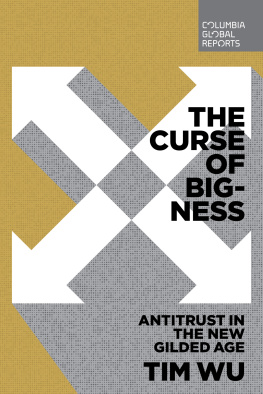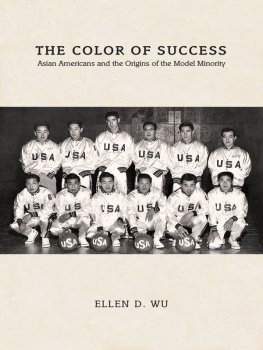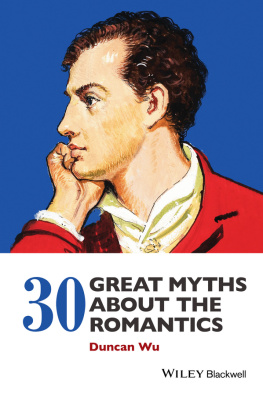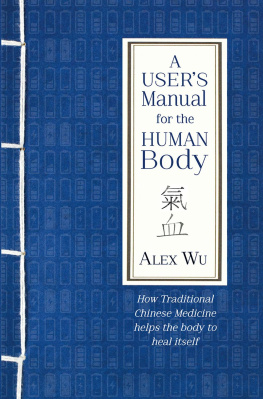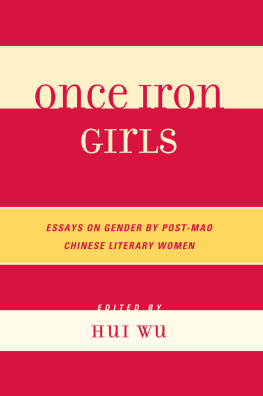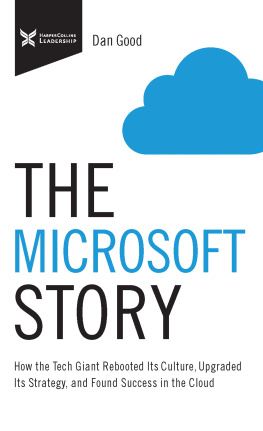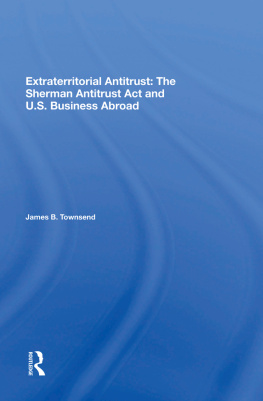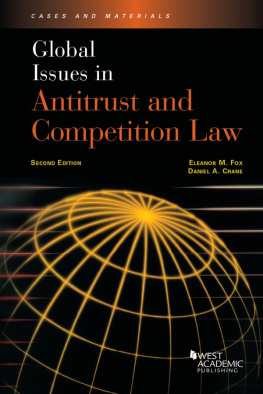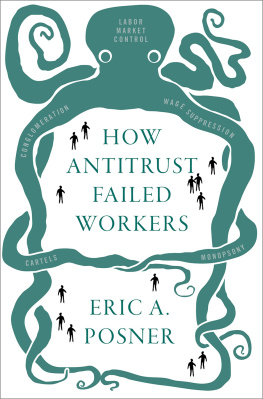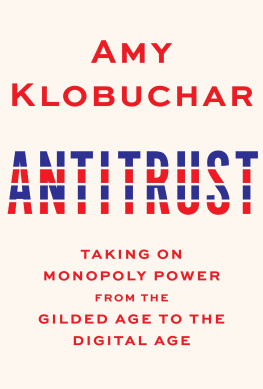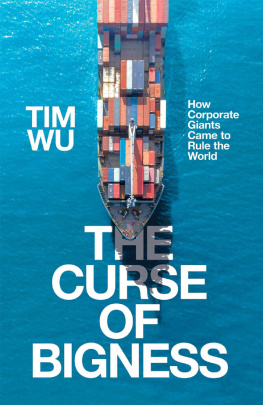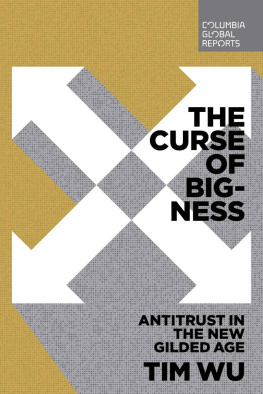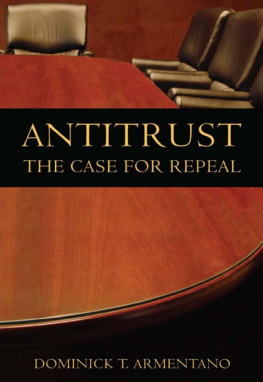
The Curse of Bigness
Antitrust in the New
Gilded Age
The Curse of
Bigness
Antitrust in the
New Gilded Age
Tim Wu
COLUMBIA GLOBAL REPORTS
NEW YORK
The Curse of Bigness
Antitrust in the New Gilded Age
Copyright 2018 by Tim Wu
All rights reserved
Published by Columbia Global Reports
91 Claremont Avenue, Suite 515
New York, NY 10027
globalreports.columbia.edu
facebook.com/columbiaglobalreports
@columbiaGR
Library of Congress Control Number: 2018949786
ISBN: 978-0-9997454-6-5
E-book ISBN: 978-0-9997454-7-2
Book design by Strick&Williams
Map design by Jeffrey L. Ward
Author photograph by Miranda Sita
Printed in the United States of America
The Curse of Bigness
Antitrust in the New
Gilded Age
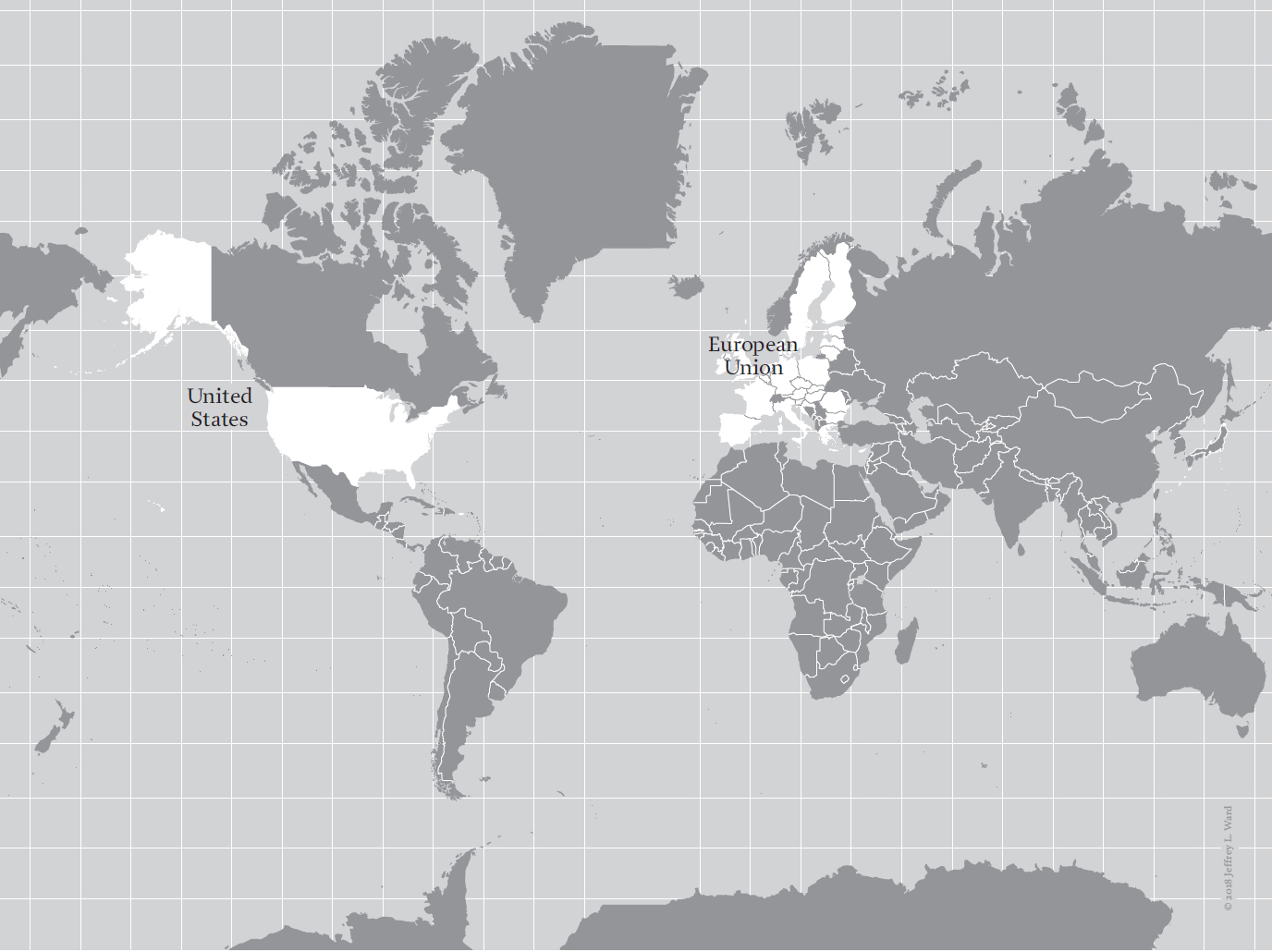
For Richard Posner, who taught me to think without fear.
CONTENTS
Introduction
We are four decades into a major political and economic experiment. What happens when the United States and other major nations weaken their laws meant to control the size of industrial giants? What is the impact of allowing unrestricted growth of concentrated private power, and abandoning most curbs on anticompetitive conduct?
The answers, I think, are plain. We have managed to recreate both the economics and politics of a century agothe first Gilded Ageand remain in grave danger of repeating more of the signature errors of the twentieth century. As that era has taught us, extreme economic concentration yields gross inequality and material suffering, feeding an appetite for nationalistic and extremist leadership. Yet, as if blind to the greatest lessons of the last century, we are going down the same path. If we learned one thing from the Gilded Age, it should have been this: The road to fascism and dictatorship is paved with failures of economic policy to serve the needs of the general public.
Look at the global economy and witness the rule of concentrated oligopolies and monopolies, in industries like finance, media, airlines, and telecommunications, just to name the most obviousfirms whose size allows them to treat customers and competitors with impunity. Most visible in our daily lives is the great power of the tech platforms, especially Google, Facebook, and Amazon, who have gained extraordinary power over our lives. With this centralization of private power has come a renewed concentration of wealth, and a wide gap between the rich and poor.
The concentration of wealth and power has helped transform and radicalize electoral politics. As in the Gilded Age, a disaffected and declining middle class has come to support radically anti-corporate and nationalist candidates, catering to a discontent that transcends party lines. A renewed economic nationalism around the world blames immigrant workers, foreign products, or elite conspiracies for the diminishment of the middle class. There is widespread anger at big business and how they treat customers, especially in concentrated or monopolized industries like insurance, pharmaceuticals, airlines, and other insensitive behemoths. Many fear Google, Amazon, and Facebook, and their power over not just commerce, but over politics, the news, and our private information.
What we must realize is that, once again, we face what Louis Brandeis called the Curse of Bigness, which, as he warned, represents a profound threat to democracy itself. What else can one say about a time when we simply accept that industry will have far greater influence over elections and lawmaking than mere citizens? When the American pharmaceutical industry can raise prices by thousands of percent, confident that government will do little or nothing? Where the middle class has no apparent influence on policies like health insurance, taxes, working conditions, housing, or other matters that determine how life is really lived?
We must now face questions that have been ignored for more than a generation. Are extreme levels of industrial concentration actually compatible with the premise of rough equality among citizens, industrial freedom, or democracy itself? Can we create broad-based wealth and a sense of entrepreneurial opportunity in an economy dominated by monopolists? Is there just too much concentrated private power in too few hands, with too much influence over government and our lives?
The questions, I think, answer themselves. The main goal of this short volume is to see how the classic antidote to bignessthe antitrust and other antimonopoly lawsmight be recovered and updated to face the challenges of our times. For roughly a century, the antitrust law served in practice and theory as an antimonopoly code that sought to limit excessive industrial concentration and to police monopoly conduct. By the midpoint of the last century, antitrust became widely understood in the Western world as a necessary part of a functioning democracy, as an ultimate check on private power.
Yet over the span of a generation, the law has shrunk to a shadow of itself, and somehow ceased to have a decisive opinion on the core concern of monopoly. The law that the Supreme Court once called a comprehensive charter of economic liberty aimed at preserving free and unfettered competition no longer condemns monopoly, but has grown ambivalent, and sometimes even celebrates the monopolistas if the anti in antitrust has been discarded.
Most of what follows can be understood to center on the recovery of one principle: that in enacting and repeatedly fortifying the antitrust laws the United States made a critical, indeed Constitutional choice in industrial and national policy. After a period of intense national debate, including a presidential election in 1912 where economic policy was a central issue, the nation rejected a monopolized economy and chose repeatedly over the decades to preserve its tradition of an open and competitive market. The goal of antitrust law must be understood as respecting that choice. Or as Louis Brandeis, the great prophet of a decentralized economy, put it, the antitrust laws answered a question: Shall the industrial policy of America be that of competition or that of monopoly?
What happened? The law is currently suffering from an overindulgence in the ideas first popularized by Robert Bork and others at the University of Chicago over the 1970s. Bork contended, implausibly, that the Congress of 1890 exclusively intended the antitrust law to deal with one very narrow type of harm: higher prices to consumers. That theory, the consumer welfare approach, has enfeebled the law. Promising greater certainty and scientific rigor, it has delivered neither, and more importantly discarded far too much of the role that law was intended to play in a democracy, namely, constraining the accumulation of unchecked private power and preserving economic liberty. Forty years ago, the famed Robert Pitofsky warned that it is bad history, bad policy, and bad law to exclude certain political values in interpreting the antitrust laws. He was right.
Antitrust has fallen into hibernation before as ideologies have shifted, only to come roaring back to meet the needs of the age. To deliver on its mandate, American antitrust needs both to return to its broader goals and upgrade its capacities. It needs better tools to assess new forms of market power, to assess macroeconomic arguments, and to take seriously the link between industrial concentration and political influence. It needs to take advantage of all that economics and other social sciences have to offer. It needs stronger remedies, including a return to breakups, that are designed with the broader goals of antitrust in mind. Finally, it needs to put courts back in the business of policing what Brandeis termed as conduct meant to suppress or even destroy competition.
Next page
